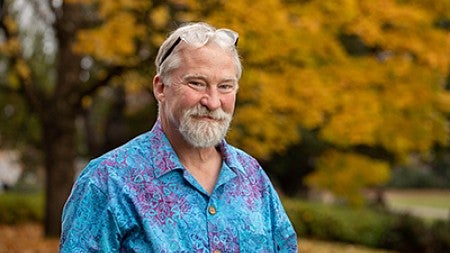
Biology
mcarrier@uoregon.edu | 541-346-4199
Courses: BI 212
In my classes you will:
- Make connections to lived experiences and real-world challenges.
- Practice foundational, transferrable skills.
- Learn with and from peers.
- Interact during exciting and participatory class meetings.
- Develop a significant project that will challenge you and make you proud.
- Understand what it means to be at a research university with the chance to gain new knowledge.
- Explore new perspectives.
I was invited into the Teaching Academy because:
- I am a Herman Award Recipient.
- I participated in a Summer Institute on Scientific Teaching.
- I participated in the UO Summer Teaching Institute.
In what ways are you working to make your teaching inclusive?
I structure all of my teaching to revolve around creating a learning community that begins on the first day of class and never ends. Enthusiastic students return to the class after having passed it to participate again and make sure the next cohort joins this community. I make time to work with students individually and in small groups in and out of class. To make this possible I spend 30 to 40 hours a week with students, and because there are so many students helping to teach the class, we can provide modeling of academic excellence from a fabulous range of individual experiences. I never stop learning from my students. I am explicit about the fact that my career success is entirely a function of the success of each my students.
What do you do in terms of professional engagement with the teaching and learning culture on campus or nationally?
I am wary of the trends that arise in the teaching profession periodically, and of the codification of best strategies in teaching. A diversity of teaching approaches is what makes College a life-enriching experience. That said, sharing experiences with a vibrant teaching community and staying current in the science of pedagogy has informed my teaching substantially. I created a course on scientific teaching with the great Elly Vandergrift in which we explore, with students, the published data that supports hypotheses about what works in teaching. I have participated at the national level by attending the summer institute on scientific teaching and the UO summer teaching institute, but I learn the most from my colleagues here on campus and from my students.
In what ways was your teaching in this course research-led—informed by research on how students learn and inflected by UO's research mission?
My teaching is heavily informed by evidence-based teaching practices. Much of what we learn by studying the pedagogy literature supports what a teacher might learn through experience, but my teaching has been transformed by conscious application of “backward design” strategies, and the realization that even the most elegant lecture explanation is of less value than providing some evidence and some guidance and asking students to draw (literally and figuratively) their own conclusions. Students do this in an environment that supports cooperative learning and that is filled with students from previous iterations of the course who can listen and provide support. My students generate hypotheses and design and/or carry out experiments to test those hypotheses both in lab sections and during our lectures. In short, I invite students to participate in the class as scientists. The success of students in biology involves much more than time spent in classes. Carrying out research here on campus, shadowing doctors and other health professionals, writing scholarship applications, and participating in pre-professional organizations and in teaching are some of the activities that help students learn what they might do with what we are asking them to learn and help students make progress generating opportunities for themselves. Encouraging students to explore these activities broadens the set of those who will do so. It also adds great talent to our research mission, and the to the community.
Where do you find inspiration? Who is a role model for you?
My students have been inspiring me throughout my career, and some of my newer role models include: A student who has somehow managed to financially support two younger siblings alone while going to school, going to medical school, and now practicing medicine. A very recent student who somehow managed to free his parents from a repressive political regime while going to school, and who is now off to an MD/PhD program. My daughters, who have reminded me what education is really all about, and who have taught me more than all my other experiences combined.
